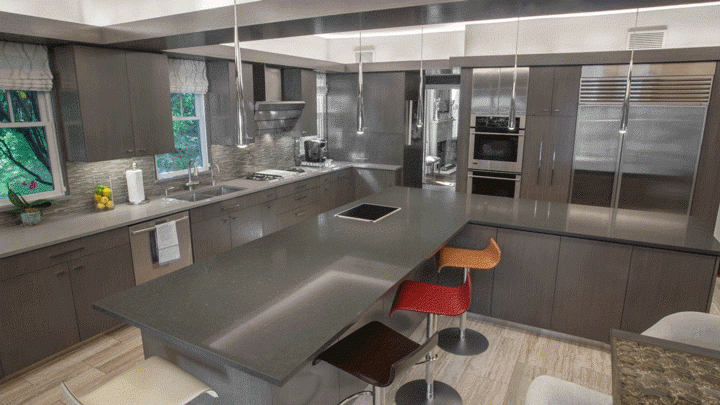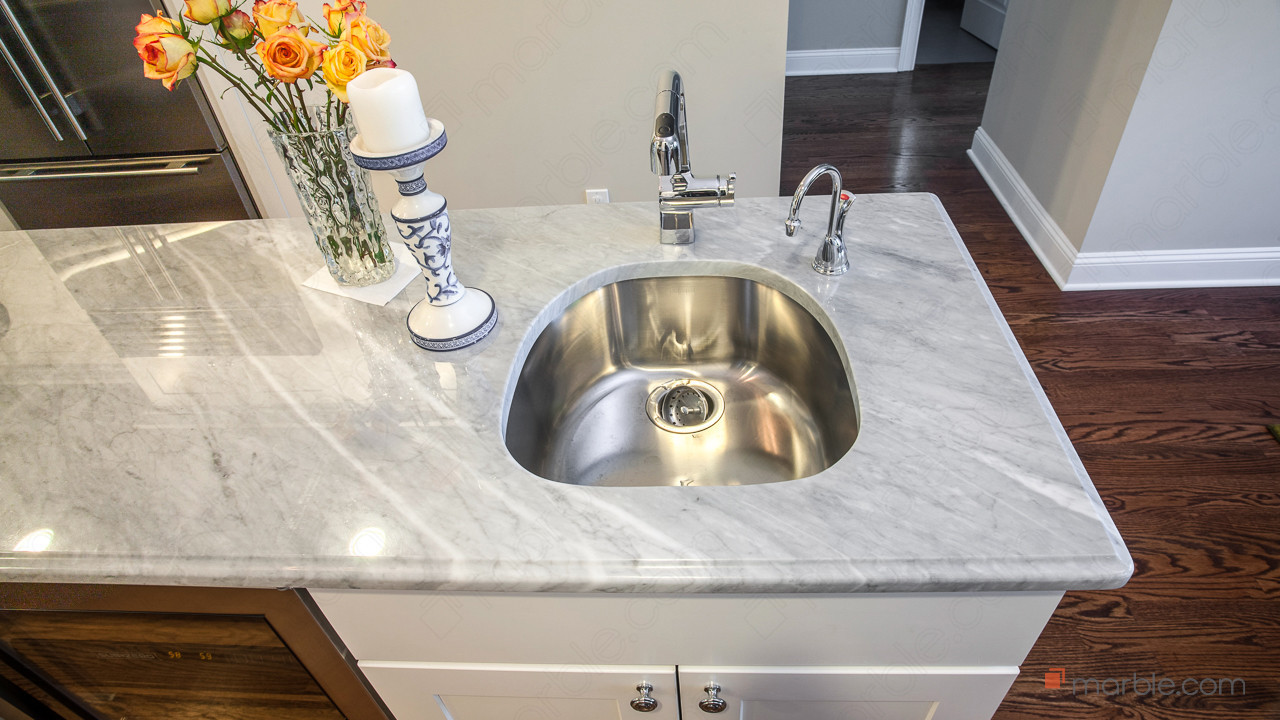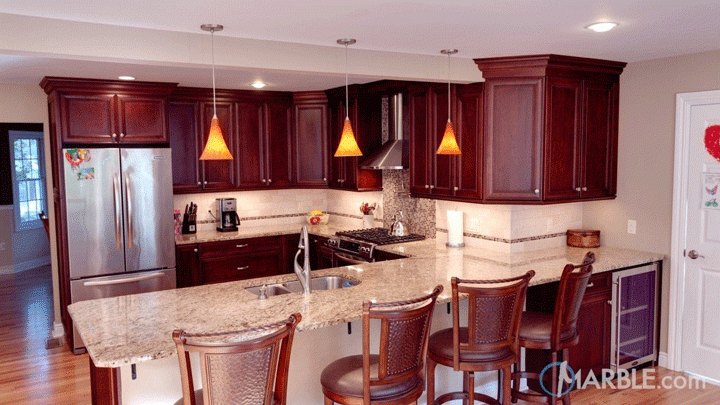
Table of Contents
During the past few decades, granite countertops have risen to become the most popular choice of homeowners. However, not all homeowners opt to install this beautiful natural stone. A popular alternative to granite countertops is quartz countertops. Quartz is an engineered stone that is created by a combination of roughly 90 percent natural quartz and 10 percent polyresin. One of the most well-known and desirable brands of quartz is Caesarstone. This brand is recognized for producing some of the most gorgeous quartz countertops that you can find. This guide will provide you with knowledge of both materials as well as comparisons between the two.
[get_quote]
What is Caesarstone?
Caesarstone is one of the most popular brands of quartz on the market. Caesarstone countertops are highly regarded for their beauty, durability and many other positive qualities. One of the advantages you will get with quartz countertops is increased customization options. This is evident when you see just how many options Caesarstone countertops offer you. The surfaces are available in a wide range of colors and styles. You can find everything from classic to contemporary to some options that mimic the look of natural stones such as granite.
As for the company itself, Caesarstone was founded in 1987. The brand was truly a trailblazer in the quartz countertop market and continues to carry a good reputation to this day. Most of the company’s manufacturing is done at their two plants located in Israel. There is also one manufacturing plant located in the United States in Richmond Hill, Georgia.
What is Granite?
Granite is the most popular natural stone countertop option among homeowners. It is beloved by many for its beauty, durability and various other positive qualities. Granite is available in the widest range of color and style options that you will find for a natural stone. There is a seemingly endless array of options when it comes to choosing granite countertops.
Granite is quarried in locations all across the world. In particular, many types of the stone come from Brazil and India. It is also found in some places in the United States.
Caesarstone vs. Granite: What Are the Differences?
The following table provides general information about both countertop options. This information is explained in further detail below.
| Caesarstone | Granite |
|---|---|
| Is an engineered stone | Natural stone |
| Will give off more of a modern look | Many styles to choose from |
| Uniform appearance | Every slab is different |
| Wide range of available options | Imperfections can add character |
As mentioned above, Caesarstone is one of the top brands of engineered stone on the market. These countertops are known for their uniform appearance that will give your home a fresh up-to-date look. Since it is engineered, you can choose from virtually any color or style that your mind can think of.
Granite, on the other hand, is one of the most beautiful stones produced by the earth. Since it is natural, each slab of granite is different – even ones that come from the same quarry. As with Caesarstone, you will have many colors and styles that you can choose from. This natural stone can have imperfections, which may sound like a negative but can actually give the stone character.
[get_quote]
What Are the Pros and Cons of Each Option?
Before you purchase new kitchen countertops or surfaces for other parts of the home, you will want to make sure to review information about your options. The following is a breakdown of the pros and cons offered by Caesarstone and granite countertops.
| Pros | Cons |
|---|---|
| Beautiful appearance | You will need to be careful with heat |
| Non-porous surface | Does not hold the ‘classic’ appeal of natural stone |
| Stain resistant | |
| Scratch resistant | |
| Crack resistant | |
| Easy to care for | |
| Many options to choose from |
Although it is not a natural stone, do not be fooled – Caesarstone is one of the most beautiful surfaces that you can install in your home. Caesarstone countertops can be found in an impressive range of colors and styles. The surfaces are also non-porous, meaning that liquid and stains cannot work their way down into the material. Caesarstone countertops are resistant to stains, scratches and cracks. Keep in mind that just because the material is resistant to these hazards, there is still a very low chance that these damages do occur. If properly cared for, these damages should not be an issue. Lastly, Caesarstone is among the easiest countertop options on the market to care for. As long as you stay up on cleaning and do not expose the surfaces to excessive heat, they should stay in great shape for years to come. While it does not hold the ‘classic’ appeal of natural stone like granite does, Caesarstone is a terrific option for your countertops.
| Pros | Cons |
|---|---|
| Incredible natural beauty | Porous |
| Durable | Can chip if you are not careful |
| Easy to care for | |
| Heat resistant | |
| Stain resistant | |
| Scratch resistant | |
| Each slab is unique, even from the same quarry |
As for granite, the stone surfaces are a reminder of the beauty that nature is capable of producing. Beyond the beauty of granite countertops, the surfaces are also one of the most durable options you can find. They are easy to clean and otherwise maintain. The countertops are resistant to heat, stains and scratches. Because it is a natural stone, each slab of granite is truly one-of-a-kind. If you are looking for some downsides to granite, the stone is porous. However, if you make sure to properly seal the countertop, which is not difficult to do, your granite can be adequately protected from liquid and stains. Granite countertops can also chip if you are not careful, although these can be fixed by simple repairs.
What Are Some Alternatives to Caesarstone?
While popular and reliable, Caesarstone is not the only brand of quartz countertops on the market. Other brands such as Silestone and Cambria also manufacture quartz countertops. However, your best bet for the largest selection of colors and styles is Caesarstone.
What Are Some Alternatives to Granite?
There are many types of natural stone that can be used for countertops. Other types include marble, quartzite, limestone, onyx, soapstone and more. While each have their pros and cons, granite is generally regarded as an excellent countertop material because of its beauty and durability.
How Much Does Each Option Cost?
Caesarstone countertops generally fall in the range of $40 to $100 per square foot, installed. Granite, on the other hand, is usually priced between $35 to $75 per square foot, installed. Overall, granite is the less expensive option, although there is some overlap in pricing between the two options.
[get_quote]
Which Countertop is Better?
Determining which countertop is the better option for your home will rely on your wants and needs. Both surfaces are beautiful and each offer tremendous benefits to your home. The information below sums up some of the key points discussed above and can help you make your decision.
-
If you are looking for a beautiful engineered stone surface that is also very durable, Caesarstone is a great option. Note that it is not resistant to heat, so you will need to exercise caution (especially in the kitchen).
-
If you want a stunning natural stone surface, granite is the way to go. While granite is resistant to heat, it is a porous material. This means you will have to re-seal the surface. Re-sealing is only necessary about once a year with granite. If you do not mind this quick and easy process, granite is a great option for you.
Determining whether Caesarstone or granite is the right choice for your new countertop is no easy task. That said, with the help of this guide, you will have more information about each option before purchasing. Countertops are a significant investment for any home, so you will want to make sure you find something that will leave you satisfied for a long time.
















 The article helped me immensely
The article helped me immensely
 I’m now more informed on the subject
I’m now more informed on the subject
 I have questions about Marble.com
I have questions about Marble.com
 The article was not accurate at all
The article was not accurate at all
 There is a serious lack of information
There is a serious lack of information
 I have questions about Marble.com
I have questions about Marble.com